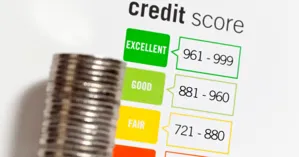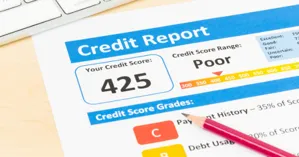
A good credit score is your financial lifeline. Without it you’re sunk when it comes to buying a car or a house. But it’s easy for your spending to get out of hand and bills to pile up. It’s also easy for someone to steal your good credit. We’ve put together nine methods to improve your credit score.
Understanding Your Credit Report
What is a credit report and why is it important?
A credit report is a detailed record of your credit history, including information about your credit accounts, payment history, and public records. It provides a comprehensive overview of your financial behavior and is used by lenders, landlords, and even potential employers to assess your creditworthiness. Understanding your credit report is essential for identifying any mistakes or discrepancies that may be negatively impacting your credit score.
Where can I check my credit report?
You’re entitled by federal law to a free annual credit report. Also, some banks will show you the credit score on your savings or checking account. Credit cards will often let you see your credit score. Either way, it’s imperative you examine it. There could be mistakes or fraud on the report. For example, an account is opened for someone else who has your name inadvertently put on your report. Or someone took a loan out in your name, which is fraud. You won’t know if you’re financially sound if you don’t check your credit score.
Major credit bureaus like Experian, Equifax, and TransUnion provide these reports, and it's crucial to review them for accuracy and to identify any errors.
Services like Experian Boost allow users to add eligible rent and utility payments to their Experian credit report, enhancing their credit profile by including positive payment history.
How to access and interpret your credit report?
You have the right to obtain a free copy of your credit report from each of the three major credit bureaus – Equifax, Experian, and TransUnion – once every 12 months. It is advisable to stagger your requests to review your credit report throughout the year continually. By examining your credit report, you can identify any inaccuracies, such as incorrect personal information or inaccurately reported accounts. Disputing these errors promptly can save you from unnecessary negative consequences on your credit score.
Ways to Improve Your Credit Score
Pay Your Bills on Time
We can’t say this enough: Thirty-five percent of your credit score is based on paying bills on time. If you haven’t been paying them on time, it’s time to start. Make it a point to pay bills by their due date. You’ll save on late fees and improve your credit score. Additionally, a credit builder loan can help individuals with limited or poor credit history improve their credit scores through timely payments reported to credit bureaus.
Limit Credit Applications
If you apply for credit in a short period of time, it makes lenders think you’re living on credit or overly dependent on it. Ensure you don’t apply for every offer that comes to you.
Improve Credit Utilization
Credit utilization is the percentage of your credit that you use. For example, if you have a $4,000 credit limit and use $2,000 of it, you have a 50 percent credit utilization. Lenders like to see a lower percentage, and having it will increase your credit score. You should keep your credit utilization at about 30 percent.
Requesting a credit limit increase can help lower your credit utilization ratio and potentially improve your credit score.
How to keep your credit utilization ratio low
Keeping your credit utilization ratio low is crucial for maintaining a healthy credit score. Your credit utilization ratio is the percentage of your available credit that you are currently using. It is calculated by dividing your total credit card balances by your total credit limits. Keeping your credit utilization ratio below 30% demonstrates responsible credit management. High credit utilization can indicate financial instability and may negatively affect your credit score.
Pay Down Debt
This might seem like an obvious one, but many people don’t do this. They keep adding debt. The amount of debt you owe affects thirty percent of your credit score. Make a plan and pay down your debt. The best course of action is to establish a solid budget and stick to it. Paying down debt also helps in maintaining a positive credit history, which is crucial for improving your credit score.
Keep Old Accounts Open
It’s a plus to show lenders you can handle multiple credit accounts, especially for long periods of time. You are rewarded for having long-standing, mature credit cards. So it isn’t wise to close one you’ve used in the past. If you’ve made on-time payments on that card and paid it off, you’ll erase the history if you close the account. If you don’t want to card, just put it away. Interacting with your credit card issuer can also influence your credit limits and utilization, which directly impacts your credit score.
Increase Credit History
If you have little or no credit, it’s hard for companies to assess you, and your credit score may be low as a result. Young people have this problem. Taking out a credit builder card and making payments on time will help you tremendously. These cards are good to start with, but many of them have high interest rates, so you don’t want to carry a balance. Additionally, using a secured credit card with a cash deposit as the credit limit and making on-time payments can also help build or rebuild your credit.
Dispute Credit Inquiries
About 25 percent of Americans have an error on their credit report. So, if you find one, dispute it. It's tedious since you must wait for the credit bureaus to investigate and respond to your claim. But if you don't do this, you could find yourself with a damaged credit score.
Steps to dispute errors on your credit report
Disputing errors on your credit report can seem daunting, but it is a necessary step to protect your financial reputation. Here are the steps to dispute errors on your credit report:
- Identify the errors: Begin by carefully reviewing your credit report and identifying any errors or discrepancies.
- Contact the credit bureaus: Once you have identified the errors, it’s time to contact the credit bureaus.
- Keep meticulous records: It’s crucial to keep meticulous records of all correspondence related to your dispute.
- Follow up regularly: After submitting your dispute letter, it’s essential to follow up regularly to ensure that the inaccuracies are rectified in a timely manner.
- Seek professional help if needed: Disputing errors on your credit report can be a complex and time-consuming process. If you need help, consider seeking the assistance of a credit counselor or attorney.
By following these steps, you can ensure that your credit report is accurate and up-to-date, which can help improve your credit score over time.
Use Credit Cards
It’s important to show that you can make payments on time, and a credit card does that. But keep balances low on all your debt. You don’t want to get in over your head. The point is to prove yourself, not torpedo yourself. Responsible credit card usage can positively impact your credit scores, which are crucial for financial health and lending eligibility.
Conclusion
There are several steps you can take to improve a credit score. But the one ingredient in all of them is work. It takes work and discipline to get yourself on a solid financial path.






